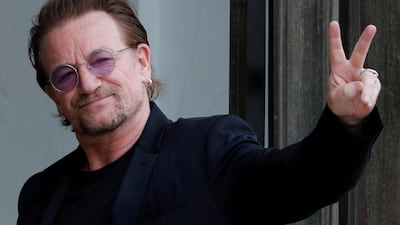Ireland’s ambassador to the UN, Geraldine Byrne Nason, offered the UAE some friendly advice on its effort to join the world body’s Security Council: be yourself, make new friends and stick to your principles.
After a tough contest with Canada and Norway, Ireland was elected to the 15-member Security Council in June and will take its seat next month.
The UAE is running for one of its two-year places in the 2022-2023 term.
Ms Nason said it was “pretty remarkable” to fend off heavyweight Canada, but even small countries such as Ireland and the UAE could secure support on the world stage by being straight-talking, courageous and upright.
“We stuck to our guns, we're principled, we're independent," she said on Tuesday. "We're a feisty country that is consistent in its foreign policy.
“I think that that, frankly, undervalued quality of authenticity ... in this entirely choppy environment internationally, comes through.”
Unlike Ireland, the UAE is expected to secure its seat unopposed. It is vying for a seat that is allocated by convention within Arab states.
The Emirates would effectively replace Tunisia after its term finishes at the end of 2021.
But the process can be arduous and involves a campaign, diplomatic soirees and scrutiny from watchdog groups in the run-up to a vote in the assembly by all 193 UN members in the middle of next year.
Ms Nason said the UAE’s envoy to the UN, Lana Nusseibeh, was “preparing very well” for the campaign and she looked forward to working with the UAE on improving lives for women in war zones.
She said Ireland’s campaign was aided by Irish rocker Bono, the U2 frontman and humanitarian, who appeared at the UN in June 2018.
“If you can grow a Bono, that would be a help, of course,” Ms Nason said.
There are big differences between the UAE and Ireland, but they also have much in common, with similar populations, economies and territories.
The UN Security Council has five, veto-wielding permanent members: Russia, China, the US, Britain and France.
Ten other seats go to elected non-permanent members who can vote on resolutions but do not have veto power.
The council meets regularly on threats to international peace and security and is the ultimate decision-maker on resolutions imposing international sanctions, authorising the use of military force and launching peacekeeping operations.
The biog
Hometown: Cairo
Age: 37
Favourite TV series: The Handmaid’s Tale, Black Mirror
Favourite anime series: Death Note, One Piece and Hellsing
Favourite book: Designing Brand Identity, Fifth Edition
FA Cup quarter-final draw
The matches will be played across the weekend of 21 and 22 March
Sheffield United v Arsenal
Newcastle v Manchester City
Norwich v Derby/Manchester United
Leicester City v Chelsea
The nine articles of the 50-Year Charter
1. Dubai silk road
2. A geo-economic map for Dubai
3. First virtual commercial city
4. A central education file for every citizen
5. A doctor to every citizen
6. Free economic and creative zones in universities
7. Self-sufficiency in Dubai homes
8. Co-operative companies in various sectors
9: Annual growth in philanthropy
How to turn your property into a holiday home
- Ensure decoration and styling – and portal photography – quality is high to achieve maximum rates.
- Research equivalent Airbnb homes in your location to ensure competitiveness.
- Post on all relevant platforms to reach the widest audience; whether you let personally or via an agency know your potential guest profile – aiming for the wrong demographic may leave your property empty.
- Factor in costs when working out if holiday letting is beneficial. The annual DCTM fee runs from Dh370 for a one-bedroom flat to Dh1,200. Tourism tax is Dh10-15 per bedroom, per night.
- Check your management company has a physical office, a valid DTCM licence and is licencing your property and paying tourism taxes. For transparency, regularly view your booking calendar.
Have you been targeted?
Tuan Phan of SimplyFI.org lists five signs you have been mis-sold to:
1. Your pension fund has been placed inside an offshore insurance wrapper with a hefty upfront commission.
2. The money has been transferred into a structured note. These products have high upfront, recurring commission and should never be in a pension account.
3. You have also been sold investment funds with an upfront initial charge of around 5 per cent. ETFs, for example, have no upfront charges.
4. The adviser charges a 1 per cent charge for managing your assets. They are being paid for doing nothing. They have already claimed massive amounts in hidden upfront commission.
5. Total annual management cost for your pension account is 2 per cent or more, including platform, underlying fund and advice charges.
Ant-Man and the Wasp
Director: Peyton Reed
Starring: Paul Rudd, Evangeline Lilly, Michael Douglas
Three stars
UAE%20athletes%20heading%20to%20Paris%202024
%3Cp%3E%3Cstrong%3EEquestrian%3Cbr%3E%3C%2Fstrong%3EAbdullah%20Humaid%20Al%20Muhairi%2C%20Abdullah%20Al%20Marri%2C%20Omar%20Al%20Marzooqi%2C%20Salem%20Al%20Suwaidi%2C%20and%20Ali%20Al%20Karbi%20(four%20to%20be%20selected).%3C%2Fp%3E%0A%3Cp%3E%3Cstrong%3E%3Cbr%3EJudo%3Cbr%3E%3C%2Fstrong%3EMen%3A%20Narmandakh%20Bayanmunkh%20(66kg)%2C%20Nugzari%20Tatalashvili%20(81kg)%2C%20Aram%20Grigorian%20(90kg)%2C%20Dzhafar%20Kostoev%20(100kg)%2C%20Magomedomar%20Magomedomarov%20(%2B100kg)%3B%20women's%20Khorloodoi%20Bishrelt%20(52kg).%3C%2Fp%3E%0A%3Cp%3E%3Cstrong%3E%3Cbr%3ECycling%3Cbr%3E%3C%2Fstrong%3ESafia%20Al%20Sayegh%20(women's%20road%20race).%3Cstrong%3E%3Cbr%3E%3C%2Fstrong%3E%3C%2Fp%3E%0A%3Cp%3E%3Cstrong%3ESwimming%3Cbr%3E%3C%2Fstrong%3EMen%3A%20Yousef%20Rashid%20Al%20Matroushi%20(100m%20freestyle)%3B%20women%3A%20Maha%20Abdullah%20Al%20Shehi%20(200m%20freestyle).%3Cstrong%3E%3Cbr%3E%3C%2Fstrong%3E%3C%2Fp%3E%0A%3Cp%3E%3Cstrong%3EAthletics%3Cbr%3E%3C%2Fstrong%3EMaryam%20Mohammed%20Al%20Farsi%20(women's%20100%20metres).%3C%2Fp%3E%0A
500 People from Gaza enter France
115 Special programme for artists
25 Evacuation of injured and sick
UAE currency: the story behind the money in your pockets
SERIES SCHEDULE
First Test, Galle International Stadium
July 26-30
Second Test, Sinhalese Sports Club Ground
August 3-7
Third Test, Pallekele International Cricket Stadium
August 12-16
First ODI, Rangiri Dambulla International Stadium
August 20
Second ODI, Pallekele International Cricket Stadium
August 24
Third ODI, Pallekele International Cricket Stadium
August 27
Fourth ODI, R Premadasa Stadium
August 31
Fifth ODI, R Premadasa Stadium
September 3
T20, R Premadasa Stadium
September 6
SPEC SHEET
Display: 10.4-inch IPS LCD, 400 nits, toughened glass
CPU: Unisoc T610; Mali G52 GPU
Memory: 4GB
Storage: 64GB, up to 512GB microSD
Camera: 8MP rear, 5MP front
Connectivity: Wi-Fi, Bluetooth 5.0, USB-C, 3.5mm audio
Battery: 8200mAh, up to 10 hours video
Platform: Android 11
Audio: Stereo speakers, 2 mics
Durability: IP52
Biometrics: Face unlock
Price: Dh849
Company%C2%A0profile
%3Cp%3E%3Cstrong%3ECompany%20name%3A%20%3C%2Fstrong%3ETuhoon%0D%3Cbr%3E%3Cstrong%3EYear%20started%3A%20%3C%2Fstrong%3EJune%202021%0D%3Cbr%3E%3Cstrong%3ECo-founders%3A%20%3C%2Fstrong%3EFares%20Ghandour%2C%20Dr%20Naif%20Almutawa%2C%20Aymane%20Sennoussi%0D%3Cbr%3E%3Cstrong%3EBased%3A%20%3C%2Fstrong%3ERiyadh%0D%3Cbr%3E%3Cstrong%3ESector%3A%20%3C%2Fstrong%3Ehealth%20care%0D%3Cbr%3E%3Cstrong%3ESize%3A%20%3C%2Fstrong%3E15%20employees%2C%20%24250%2C000%20in%20revenue%0D%3Cbr%3EI%3Cstrong%3Envestment%20stage%3A%20s%3C%2Fstrong%3Eeed%0D%3Cbr%3E%3Cstrong%3EInvestors%3A%20%3C%2Fstrong%3EWamda%20Capital%2C%20Nuwa%20Capital%2C%20angel%20investors%3C%2Fp%3E%0A


